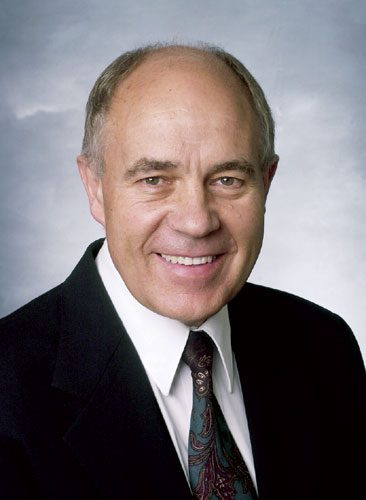Among our greatest gifts, words can edify or destroy, uplift or degrade.

Constance K. Lundberg | Photo by Seth Smoot
Words are my tools. As a librarian I collect, catalog, and preserve them. As a lawyer I search them out, savoring their power, sound, feel, and nuance. As a mother I teach, and teach with, words—a method of motivation, reward, and reprimand. As a person of faith I find them second only to spiritual promptings as a form of guidance, comfort, and inspiration.
Lately, however, I have observed a distressing escalation of the use of words to hurt, anger, divide, and make war. As a law professor perhaps I should approve of the trend. It does, after all, make well-paying work for our graduates. However, I have viewed myself as a solver of problems and a peacemaker, not as a warrior. I have not found entertainment in L.A. Law or its more recent progeny. Neither am I comfortable with the wars of words that rage around us.
Words are among the most marvelous gifts we have as humans. Words are tools God uses to build the necessary framework to lift us from our mortal existence and carry us back to His presence. He uses words for making binding commitments with us. The difference between an eternal marriage and degrading cohabitation is a few words.
In the marriage vows our words and those of the sealer who binds us together are more than just symbols of the marriage. Words are the mechanism for making the vows and for our Father’s accepting our commitment. The words are the wedding—the binding.
The mundane uses of words are also important, as their consequences are not mundane. These uses are the ones that get us into the most difficulty. In our daily speech we often use words casually. We toss them out, sometimes careless of their impact. We drum up a phrase for its immediate effect without thinking of its long-term consequences.
My father would not tolerate vulgarity or profanity to be used by his children. Once, when I was about 11, I used a word, often used by my friends and classmates and also used, though not in my father’s presence, by my siblings. It was a mild expletive whose original meaning had been lost through millions of thoughtless repetitions. He asked in a disappointed tone if my education from my parents had left me so stunted in vocabulary that I could find nothing to say of greater grace or meaning.
My relatives of the same generation viewed speech, and especially storytelling, as entertainment, art, and a way to build and maintain subtle and nuanced relationships of love and respect. Many of the stories were funny, many tender. Well-chosen language was a hallmark of intelligence and leadership.
I compare that with the mindless gutter language that washes over us as we watch television or movies or just walk down the street. I loved the movie Apollo 13 but was interested and relieved when I read an interview of one of the astronauts from that amazing flight. Commenting on the film, he said it was pretty accurate except that there was no antagonism between crew members, they did not drink alcohol while in training, and no one on the crew swore. Apparently, the filmmakers felt the need to use profanity to pump energy into the dialogue—sort of like adding salt to increase flavor. Surely, this story had enough flavor on its own that it did not require an extra few handfuls of salt.
I love the grace, strength, and skill of basketball. But sitting in the stands, surrounded by booing, shouting, and harassment of players and referees, I sometimes find my blood pressure shooting up. In too many sporting events and in television shows like The Weakest Link and American Idol, the real sport is the abuse.
The law uses the term fighting words for insults so foul that the victim of such insults is entitled to fight back. In the words of one court, “[Fighting words] by their very utterance provoke a swift physical retaliation and incite an immediate breach of the peace.” 1 The words themselves constitute assaults. If you are interested in what words those might be, listen to some of the more popular rap recordings. I have been dismayed to read in legal literature that some scholars think even these words have become so common in public discourse that, except for one or two racial epithets, there may no longer be words that meet the legal standard of fighting words.
Elder Charles Didier of the First Quorum of the Seventy taught us to remember that our “words are a form of personal expression. They differentiate us as well as fingerprints do. They reflect what kind of person we are, and tell of our background, and depict our way of life. They describe our thinking as well as our inner feelings.”
Elder Didier went on to say:
Language is of divine origin. Only man speaks (and women do even better), and he does so because of the purpose for which he was created. Let us listen to Paul when he said: “Though I speak with the tongues of men and of angels, and have not charity, I am become as sounding brass, or a tinkling cymbal” (1 Cor. 13:1). Anacharsis, when asked what was the best part of man, answered: “The tongue.” When asked what was the worst, the answer was the same: “The tongue.”2
James wrote: “Therewith bless we God, even the Father; and therewith curse we men, which are made after the similitude of God. Out of the same mouth proceedeth blessing and cursing. My brethren, these things ought not so to be” (James 3:9–10).
Words can be a healing balm or gasoline on the fire in disputes with family, neighbors, friends, or colleagues. Television and movies have created a tolerance for overblown emotion, and where once we sought the subtle or understated, we now often feel the need to heat up our vocabulary. Consider these different ways to make the same point: 1) “I don’t remember things that way.” Or, “You are lying.” Or my personal favorite, “You are a fraudulent malfeasor!” 2) “Let’s think together to try to solve this problem.” Or, “That’s dumb. Let me do it.” 3) Or consider the parent of one of my son’s basketball teammates, who proposed that, as parents, we quit yelling negative comments to referees and instead praise them when they do well and encourage our boys on in the face of adversity. It seems to be making an impact in the tenor of games and has even reduced, though it has not stopped, the foul language.
When we attack people with whom we disagree, we injure or even end our ability to resolve disputes. Each time we raise the temperature in the discourse it is harder to reconcile differences. The Apostle Paul admonished us: “But now ye also put off all these; anger, wrath, malice, blasphemy, filthy communication out of your mouth” (Col. 3:8).
Tenderness and loving speech are more important in families than anywhere else. Several years ago, my mother and I were at a dinner with a large family. There was one particularly attractive young couple. Their three beautiful children were talented and bright. The parents were successful in the community and apparently had everything. Later, Mother grieved over the pain in this couple’s relationship. I questioned her judgment. They were joking and laughing; they were the life of the party. She was not fooled by the jokes. Every funny comment by one put the other in a bad light, she noticed. Two years later, they were divorced. Mother saw, as I did not, that cutting, hurtful words are not ameliorated by humor—just disguised.
Again, Elder Didier gives great guidance: “Love at home starts with a loving language.”3 Studies of couples who stay married show that they are kind to each other. Any criticisms are couched as exceptions in a nest of praise and love.
Elder Lynn G. Robbins of the First Quorum of the Seventy wrote of Satan’s efforts to destroy families:
His strategy is to stir up anger between family members. Satan is the “father of contention, and he stirreth up the hearts of men to contend with anger, one with another” (3 Ne. 11:29; emphasis added). The verb stir sounds like a recipe for disaster: Put tempers on medium heat, stir in a few choice words, and bring to a boil; continue stirring until thick; cool off; let feelings chill for several days; serve cold; lots of leftovers.4
Finally, as a mother, grandmother, great grandmother, and Primary president, I must talk a bit about words that heal children and words that wound them. Children are tender. They want to please. They want to do right. Sometimes they do not know how to do so, but they will strive to do right unless they are beaten down. We have all lost our temper on occasion with a particularly persistent child. But remember the Savior’s love for them. His admonition, repeatedly, is that we should be like them. A child will make mistakes. She may do bad things. But she is not bad. Psychological studies suggest that a child’s brain is forming and reforming, building connections and synapses. When we discipline or reprimand a child, we are truly building that child. If we teach a child she is bad, we teach her to be bad. If we teach a child she is good, she strives to become good.
President David O. McKay counseled: “Three influences in home life awaken reverence in children and contribute to its development in their souls. These are: first, firm but gentle guidance; second, courtesy shown by parents to each other, and to children; and third, prayer in which children participate.”5 All words.
Everything given to us by our Father is given for our eternal salvation. However, any gift can be abused or turned to evil purposes. Words, the power of language, are among the greatest gifts and, therefore, have great potential for good or evil. We can use words for our edification and to bless the lives of others.
Notes
1.Skelton v. City of Birmingham, 342 So. 2d 933, 936–37 (Ala. Crim. App.), remanded on other grounds, 342 So. 2d 937 (Ala. 1976).
2. Charles Didier, “Language: A Divine Way of Communicating,” Ensign, November 1979, p. 25.
3.Ibid.
4.Lynn G. Robbins, “Agency and Anger,” Ensign, May 1998, p. 80.
5. David O. McKay, “Spirituality, the Goal in Life,” Improvement Era, December 1956, p. 915; capitalization and italics adjusted.
Constance Lundberg is associate dean at the J. Reuben Clark Law School and has served as law librarian of the Howard W. Hunter Law Library. This article is adapted from her March 11, 2003, devotional address, the full text of which is available at more.byu.edu/lundberg.









